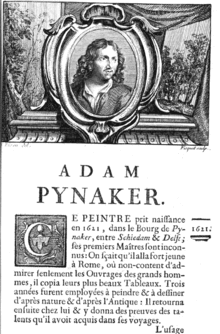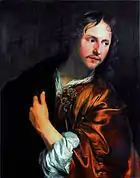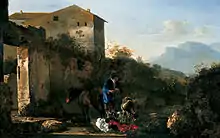Adam Pynacker
Adam Christiaensz Pynacker or Pijnacker[1] (15 February 1622, Schiedam - buried 28 March 1673, Amsterdam[2] ) was a Dutch Golden Age painter, mostly of landscapes.

Biography
Pynacker was the son of a wine merchant, who was a member of the vroedschap, or city regency. He travelled to Italy and was gone for three years. In 1658 he converted to Catholicism in order to marry Eva Maria de Geest, Wybrand de Geest's daughter. Two years later his portrait was painted by his father-in-law as a pendant to an earlier portrait of his wife. In Schiedam he baptized two children, but from 1661 until he died, he lived on the Rozengracht in Amsterdam.
Wedding portraits
De Geest was a highly successful portrait painter who painted his daughter in 1652 and two years after their marriage he painted his new son-in-law's portrait in a matching style as pendant:
 Adam Pynacker, by his father-in-law
Adam Pynacker, by his father-in-law Eva de Geest, Pynnacker's wife
Eva de Geest, Pynnacker's wife
Legacy

Pynacker is considered an example of an Italianate landscape painter, along with Jan Both, Jan Baptist Weenix, Nicolaes Berchem and Jan Asselyn. He specialized in decorating whole rooms. According to Houbraken, he would turn in his grave if he knew how the fashions had changed, but the poet P. Verhoek wrote a poem about one of his decorated rooms.[3]
References
- Usually "Pijnacker" in Dutch sources, but still "Pynacker" in English ones. For example "Adam Pynacker" is the "preferred" spelling of Getty Union, is used by the National Gallery in Washington Archived 2011-06-12 at the Wayback Machine, the Fitzwilliam in Cambridge & the Courtauld in London etc.
- Pijnacker, Adam at the RKD databases
- Adam Pynaker biography in De groote schouburgh der Nederlantsche konstschilders en schilderessen (1718) by Arnold Houbraken, courtesy of the Digital library for Dutch literature
- Wassenbergh, A. (1969) Het huwelijk van Adam Pijnacker en Eva Maria de Geest. In: De Vrije Fries, diel 49, pp. 93–95.
| Wikimedia Commons has media related to Adam Pijnacker. |
External links
- Adam Pynacker at Artist-Finder
- Adam Pynacker at the Dulwich Gallery
- Adam Pynacker at the Courtauld Institute of Art
- Pijnacker in Joconde database
- Adam Pynacker at the Web Gallery of Art
- Works and literature on Adam Pynacker at PubHist
- Vermeer and The Delft School, an exhibition catalog from The Metropolitan Museum of Art (fully available online as PDF), which contains material on Adam Pynacker
- Dutch and Flemish paintings from the Hermitage, an exhibition catalog from The Metropolitan Museum of Art (fully available online as PDF), which contains material on Adam Pynacker (cat. no. 20)